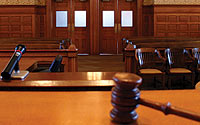 In a closely watched case, a federal appellate court has ruled in favor of video-sharing site Veoh in a copyright infringement case brought by Universal
Music Group.
In a closely watched case, a federal appellate court has ruled in favor of video-sharing site Veoh in a copyright infringement case brought by Universal
Music Group.
The 9th Circuit ruled on Tuesday that Veoh qualified for the Digital Millennium Copyright Act's “safe harbor” provisions and, therefore, wasn't liable for infringement
by users. The opinion in the closely watched dispute could bode poorly for Viacom, which is
involved in similar litigation against Google's YouTube.
Universal's dispute with Veoh dates to 2007, when Universal sued the video company for allegedly hosting music videos by groups like
Black Eyed Peas. Universal compared Veoh to companies like Napster and Kazaa, alleging that Veoh was "a massive copyright infringer that has built its business on the back of others' intellectual
property."
advertisement
advertisement
Veoh itself declared bankruptcy last year; it was subsequently absorbed by Qlipso Media Networks, which currently operates Veoh.com.
Veoh said in court papers that it
removed specific clips upon request of the owner. In addition, the company took steps aimed at preventing pirated clips from appearing on the service, including using filtering technology.
Veoh argued that it was immune from liability under the Digital Millennium Copyright Act's safe harbors, which generally say that Web sites aren't liable for users' infringement as long as the
sites remove pirated material upon request.
But those safe harbors have some exceptions, including for companies that know of infringement on their sites. Universal argued that Veoh fell
within that exception because it knew that some users posted pirated clips to the site.
The 9th Circuit rejected that position on Tuesday, stating that companies like Veoh only lose the safe
harbor defense if they have “specific knowledge” of a particular clip that is infringing, as opposed to general knowledge that infringement occurs at the site.
“Requiring
specific knowledge of particular infringing activity makes good sense in the context of the DMCA, which Congress enacted to foster cooperation among copyright holders and service providers in dealing
with infringement on the Internet,” the court wrote.
The 2nd Circuit Court of Appeals is considering the same issue in a case by Viacom against YouTube. In that matter, a trial judge
ruled that YouTube was entitled to the safe harbors and dismissed Viacom's lawsuit. Viacom is now asking an appellate court to reverse that decision and rule
against YouTube. The judges on the 2nd Circuit need not follow the precedent set by the 9th Circuit, but if they do then Google appears likely to prevail in the Viacom litigation.
But even if
the 2nd Circuit disagrees and rules against Google, the Veoh decision will increase Google's odds of convincing the U.S. Supreme Court to get involved, says Santa Clara University law professor Eric
Goldman. “If YouTube loses this case, that will be hard to reconcile with the Veoh ruling,” he says.